‘Yellow Jacket’ protests paralyze Paris and threaten Macron’s government

PARIS — The City of Light was a ghost town Saturday. The Louvre, the Eiffel Tower, high-end restaurants and department stores were closed, many boarded up; major Metro stops were gated shut; main arteries were blocked by barricades and squadrons of helmeted police carrying riot shields. It was a “day of high risk,” the police warned, recommending that residents not leave home.
“I’ve never seen Paris like this before,” said my translator, Anne Millereau, on an eerily deserted street one block from the Champs Élysées and not far from the Arc de Triomphe, where apartment buildings were darkened and not even a dog-walker could be seen on the sidewalk. “It feels like a scene from a zombie movie. Or a war zone,” she added, as a boom, apparently from police shooting tear gas, echoed from nearby.
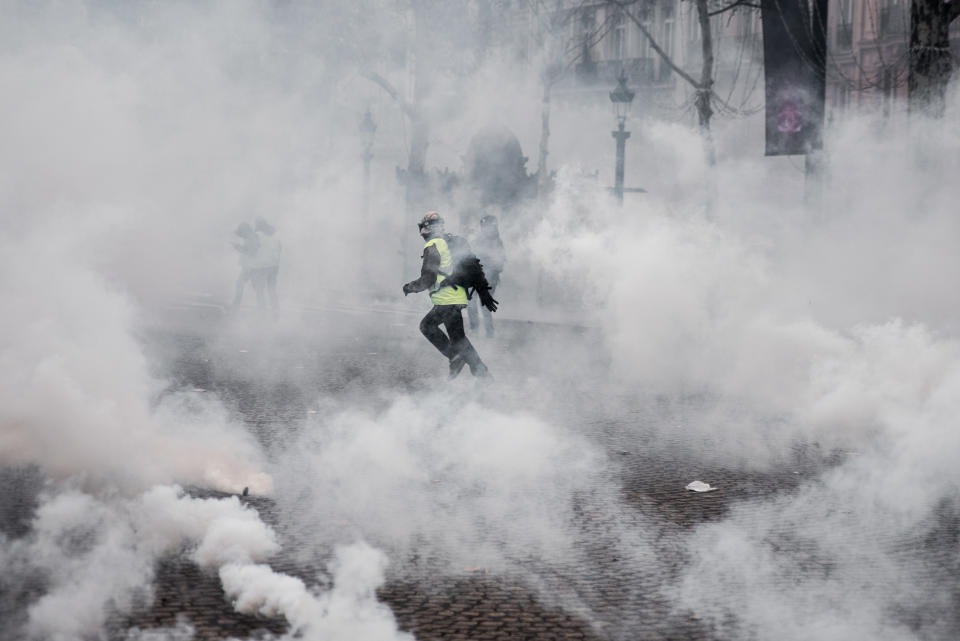
See more – Photos: 4th consecutive Saturday of anti-government protests in Paris >>>
And in a way, it was a war zone, except it was hard to say exactly what was being fought over. The ostensible reason for the weekend demonstrations that began a month ago — an increase in gasoline taxes as part of the government’s environmental program — had been rescinded, but the so-called “Yellow Jackets,” named for the lemon-colored car emergency vests they don for weekend demonstrations, were back. On Saturday, 10,000 of them, showed up in Paris, a 25 percent increase on the weekend before, some traveling five hours by bus from southern France or six hours from coastal Brittany. Another 120,000 across France occupied toll booths and petroleum depots in what they called “Act 4” — the fourth in a weekly series of demonstrations, perhaps better described as riots, that have resulted in an estimated $1 billion in damages to monuments, stores, restaurants and tourism. It amounts to “a crisis,” said Finance Minister Bruno Le Maire.
And they have captured the world’s attention, with many people trying to shape or benefit from the crisis, including President Trump, the hard-right French politician Marine Le Pen and Russia. “Everybody is trying to make it their movement,” says Mort Rosenblum, a former editor at the International Herald Tribune, who’s lived in France 33 years. He’s familiar with the French tendency to organize and rebel when their benefits, including free university education and a generous social safety net, are threatened. “My concern,” he added, “is that this movement is leaderless.”

The Yellow Jacket movement “is very significant,” says businessman Charles Bonaparte, a historian, former politician and descendent of Napoleon. “A large part of French society disagrees with the politics of President Macron.” The problem, he says, is that “it’s hard to interpret what kind of disagreement they have with him.”
It all began when groups on Facebook organized an event on Nov. 17, intended as a peaceful demonstration against increased petroleum taxes planned for the new year. In France, unleaded gasoline and diesel are already taxed at 64 and 59 percent respectively, among the highest rates in Europe, and retail prices are as high as $6.30 a gallon.
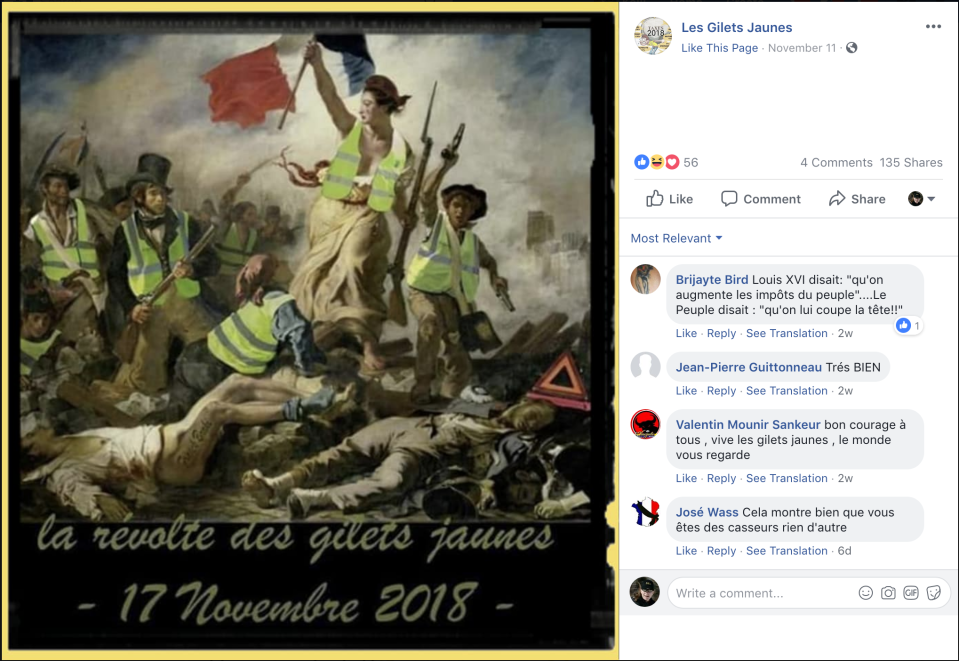
President Emmanuel Macron, a political unknown in 2017 when he defeated Le Pen, the leader of the hard-right National Front, has fashioned himself as a reformer and is a cheerleader for the carbon-reducing Paris Climate Agreement. He instituted the tax increase to discourage fossil fuel use, but the French, who eschew gas-guzzling SUVs for compact, fuel-efficient cars, weren’t having it. It especially irked them that greenhouse gas emissions have been decreasing some 2 percent annually in Europe, while increasing in China and the United States.
The issue is not, as President Trump erroneously asserted in a tweet Saturday, that the Yellow Jackets are against the Paris Climate Agreement. Nor were they, as Trump also tweeted yesterday, chanting “We want Trump.” What they want is Macron, or, more accurately, his resignation, if not his head; his approval rating in one recent survey was 23 percent. “Where are you, Macron?” they chanted on the Champs Elysées. “We will screw you! Resign!” The Yellow Jackets are not against doing something about climate change, but they don’t believe this tax will address the issue. “I’m all for ecology, but this money is just going to the petroleum lobby,” said Yellow Jacket protester and photographer Léon Stankovic, a student in Paris.
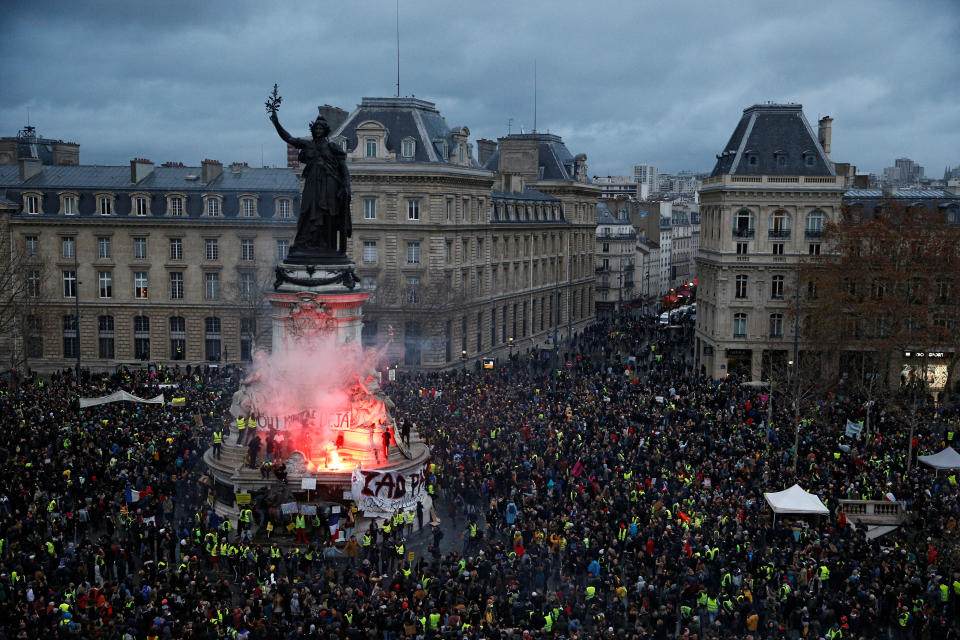
Over and over, protesters — a surprising number of them middle-aged, rather than the students who have led Paris demonstrations in the past — said the cost of living is too high, relative to wages outside the capital, where many working-class Parisians have moved in recent years, driven out by sky-high rents. Unlike Paris, the provincial towns and villages where many Yellow Jackets come from are not well served by trains and other public transport, making cars (and gasoline) mandatory. Even Macron supporters, like a wealthy Parisian entrepreneur who only gave his first name, Gilbert, believe the fuel tax was not well thought out. “It’s one thing,” Gilbert says, “to increase taxes for fuel in Paris,” but he, like the Yellow Jackets themselves, thinks that those living in other parts of France would have been unfairly penalized.
The protests have become increasingly violent, costly, dangerous and unfocused; more than 1,700 were arrested around the country Saturday, many for carrying hammers or other potential weapons. In another potentially ominous sign, some carried signs calling for a “Frexit” — a withdrawal from the European Union, which, together with the slow-motion disaster of “Brexit,” could spell the end of the organization.
By nearly all accounts, Macron’s presidency appears in grave danger. Nationalist provocateur Steve Bannon, who has been spending much of his time promoting right-wing parties in Europe recently, has been saying for months, even before the protests began, that the French president is “in a death spiral.” And now some are wondering if he’s right about a populist surge in all corners of Europe. “Perhaps this is the French page of this populist movement we’re seeing everywhere from the U.S. to England to Italy and Austria,” Bonaparte speculates.
Francois Villette, who works in the City Hall of Roquebrune-sur-Argens, a town in the south of France where Yellow Vests have besieged toll booths, sees the movement as the French equivalent of the Arab Spring — the pro-democracy movement that ended disastrously in most of the Arab world.
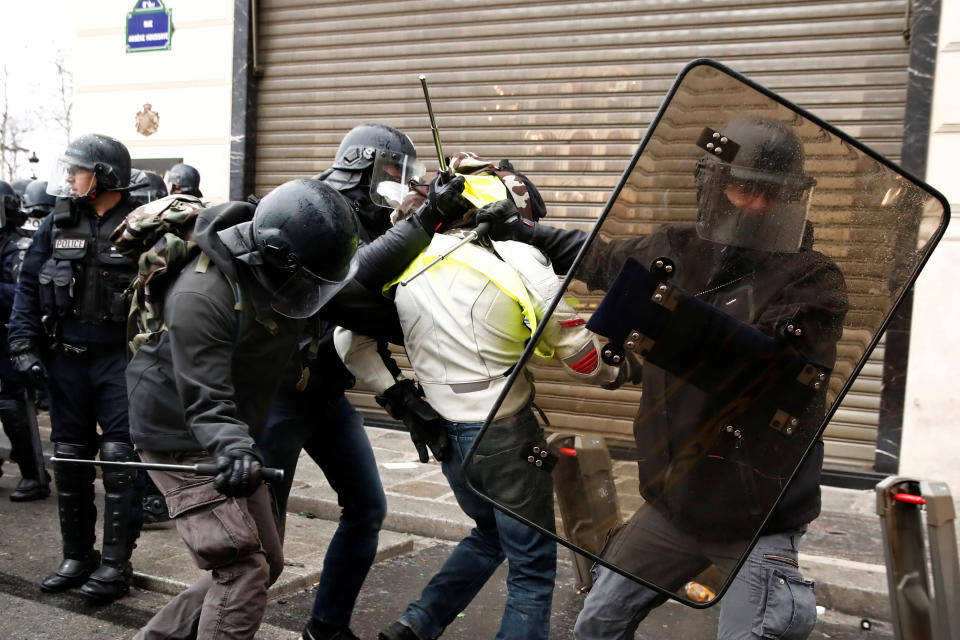
Others speculate that Russia has a hand in this – as well as other populist movements, some of which Russia has openly funded, including Le Pen’s.
According to the Times of London, a report from the cybersecurity firm New Knowledge shows that some 200 social media accounts, believed to be operated by Russian actors, disseminated misinformation about the Yellow Jacket protests, adding fuel to the fire with false stories of police brutality and showing an administration far adrift from its people.
Whether Macron, scheduled to address the nation Monday evening, holds on or not, the big loser in the short term may be the climate change movement, which Trump has scoffed at. Yesterday’s “Act 4” demonstration ate into another anti-climate change march, attended by merely 2,000 “green vests,” compared to the 160,000 that have attended two such marches earlier this fall — with many scared off by the Yellow Jackets violence.
And Rosenblum, for one, thinks “We’re facing the end game in terms of climate change.” Leaders who try to obstruct altering our lifestyle to address it, he believes, “are guilty of crimes against humanity.”
But try telling that to the Yellow Jackets.
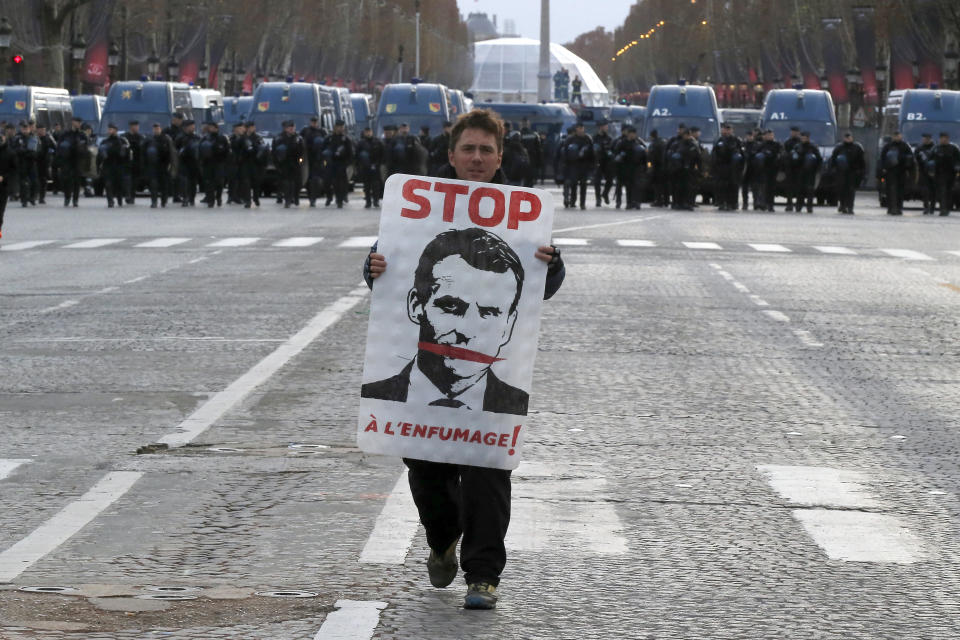
_____
Melissa Rossi, a writer based in Barcelona, is the author of the geopolitical book series “What Every American Should Know About the Rest of the World.” (Plume/Penguin).
_____
Read more from Yahoo News:
Cohen is a ‘serial liar,’ says former Trump aide Lewandowski
Take a number: Migrants, blocked at the border, wait their turn to apply for asylum
An American killing: Why did the U.S. Park Police fatally shoot Bijan Ghaisar?
I called George Bush a ‘wimp’ on the cover of Newsweek. Why I was wrong.
Photos: 4th consecutive Saturday of anti-government protests in Paris


